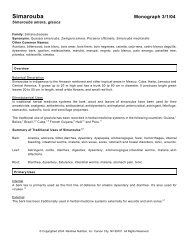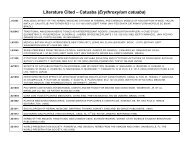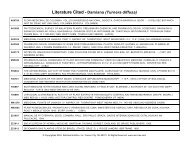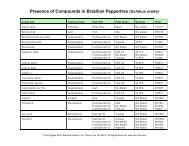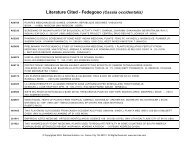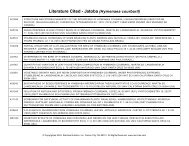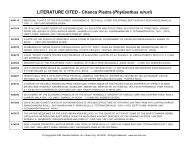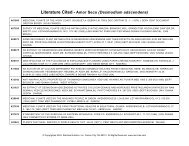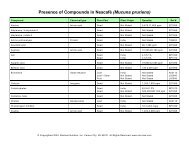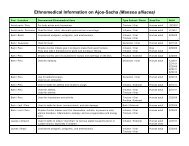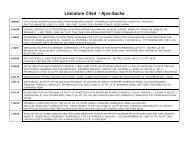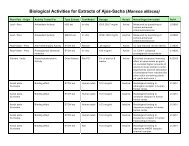Organ Specific Guide - Raintree Nutrition, Inc
Organ Specific Guide - Raintree Nutrition, Inc
Organ Specific Guide - Raintree Nutrition, Inc
You also want an ePaper? Increase the reach of your titles
YUMPU automatically turns print PDFs into web optimized ePapers that Google loves.
MYCO EXTRACT or CAPSULES<br />
2 Fluid Ounces / 60 ml or 120 Capsules / 650 mg<br />
Description: Over 100 documented species of mycoplasma bacteria have been recorded to cause various<br />
diseases in humans, animals, and plants. Mycoplasma pneumonia, as well as at least 7 other mycoplasma<br />
species, have now been linked as a direct cause or significant co-factor to many autoimmune diseases<br />
including, rheumatoid arthritis, Alzheimer's, multiple sclerosis, fibromyalgia, chronic fatigue, diabetes,<br />
Crohn's Disease, ALS, nongonoccal urethritis, asthma, and lupus, just to name a few. In 1997, the National<br />
Center for Infectious Diseases, Centers for Disease Control and Prevention's journal, Emerging Infectious<br />
Diseases, published the article, "Mycoplasmas: Sophisticated, Reemerging, and Burdened by Their<br />
Notoriety" which stated: " Recently, mycoplasmas have been linked as a cofactor to AIDS pathogenesis<br />
and to malignant transformation, chromosomal aberrations, the Gulf War Syndrome, and other unex-plained<br />
and complex illnesses, including chronic fatigue syndrome, Crohn's disease, and various arthritides." For<br />
more information on the link between mycoplasmas and autoimmune diseases, please see the <strong>Raintree</strong><br />
website at http://www.rain-tree.com/myco.htm.<br />
Traditional uses by organ or system: Immune/Lymphatic System: For autoimmune disorders<br />
(fibromyalgia, CFS, rheumatoid arthritis, etc.).<br />
Ingredients: A proprietary blend of mullaca (Physalis angulata), Brazilian peppertree (Schinus molle),<br />
anamu (Petiveria alliacea), clavillia (Mirabilis jalapa), macela (Achyrocline satureoides), fedegoso (Cassia<br />
occidentalis), picão preto (Bidens pilosa), and uva ursi (Arctostaphylos uva ursi). The extract is prepared<br />
with distilled water and 40% ethanol.<br />
Suggested Use: Capsules: Take 3 capsules twice daily. Extract: Take 60 drops (2 ml) 2-3 times daily.<br />
Contraindications: None known.<br />
Drug Interactions: None known.<br />
Other Practitioner Observations and Possible Precautions:<br />
• Several plants in this formula have been documented to reduce blood pressure in animal studies.<br />
Individuals with low blood pressure should be monitored for this effect.<br />
• All of the plants in this formula have demonstrated antimicrobial effects in laboratory studies. Supplementing<br />
the diet with probiotics and digestive enzymes is advisable if this formula is used for longer<br />
than 30 days.<br />
• Herxheimer reactions are common with this product. <strong>Inc</strong>reasing fluid intake is advised.<br />
• For autoimmune disorders with an suspected underlying mycoplasmal infection, this formula is often<br />
combined with Amazon A-F capsules and Immune Support (2 capsules of each formula 2-3 times daily)<br />
for a cycle of two or three months.<br />
Synopsis of research: (Please the online Tropical Plant Database for all cited research.)<br />
• Mullaca has demonstrated broad-spectrum antibacterial and antimycobacterial actions in laboratory tests<br />
against Mycobacterium intracellulare, M. malmoense, M. avium, M. kansasi, and M. tuberculosis.<br />
• Brazilian peppertree has demonstrated very strong antibacterial actions against numerous bacteria.<br />
• Anamu has demonstrated antimicrobial properties in vitro against numerous pathogens, including<br />
Escherichia coli, Staphylococcus, Pseudomonas, Shigella, and Mycobacterium tuberculosis.<br />
• Clavillia contains patented Mirabilis antiviral proteins (MAPs) which have shown specific antiviral,<br />
antibacterial, and antifungal actions in laboratory research.<br />
• Macela has demonstrated in laboratory studies antiviral, antibacterial, antimycoplasmal, and immunostimulant<br />
actions.<br />
• Fedegoso has demonstrated antibacterial actions against E. coli, Salmonella, Bacillus, Pseudomonas,<br />
and Staphylococcus in laboratory tests.<br />
• Picão preto's antimicrobial activity against Klebsiella pneumonia, Bacillus, Neisseria gonorrhea, Pseudomonas,<br />
Staphylococcus, and Salmonella have been reported through in vitro testing. It was also reported<br />
to have antimycobacterial activity towards Mycobacterium tuberculosis and M. smegmatis.<br />
• Uva ursi has been documented in laboratory research with antimycoplasmal actions against Ureaplasma<br />
urealyticum and Mycoplasma hominis.



